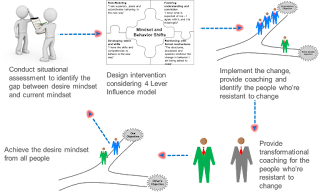Understanding Negotiating Power
Success and failure in negotiating is driven by the power dynamic. Who holds more power? How much power? What and when the power is deployed?
Negotiating power can come from any sources and takes in many different forms. In general negotiating power can be in the form of tangible resources which called HARD POWER and intangible resources which called SOFT POWER.
HARD POWER
Hard power is measurable, and this power can come from
- Dependency : This is where one parties dependent to the other. You're at disadvantage when you're exclusively dependent to your opponent. Example, your opponent maybe provide more than 50% of your revenue or you may only have single supplier
- Market conditions : Predicted future business could be used to build a circumstances that may work for you or against you. Example, your customer could make high demands based on their performance, market share or limited availability of subtitute products.
- Knowledge : What you know and what they know can create major impact in the power dynamic. Having knowledge or information that your opponent don't have, could change the power dynamic to yours side. Example, your opponent can have superior negotiating power by holding useful information about your organisation that you don't
- Time : Time is always can be useful resource in any negotiation. Putting your opponent under time pressure to reach decision may be give you clear advantage. Example, your opponent may refuse to move any further with reason of time they have invest in negotiation.
SOFT POWER is less tangible and more belief driven. This power can come from
- Relationship : When your opponents holds influential relationship with your business colleagues outside negotiating room, it can work against you. Example, your opponent's close relationship with your CEO could be either you power or their power
- Legitimacy : How credible are your opponents? Are their argument logical and proven? Perceived credibility is a powerful factor in negotiation. Example, your opponents has a recognised history of intimidating and enforce deal to put supplier out of business
- Social : Social context often plays part in negotiating power. Example, In the union and company negotiation, bring up the issue to the press could embarrased the company reputation
- Trust : Is very fundamental part in the business and in any negotiation. The more trust exist between parties, the fewer condition necessary and the faster agreement could be reach. Example, resolution could made quicker and easier since previous negotiation have been sincere and provide successful to both parties
HOW POWER BRINGS CONTROL IN NEGOTIATION
- Identify the power balance
Keep control at the negotiating table and you steer the deal-making process to your advantage. Control comes from understanding and exploiting the balance of power. First, assess the power landscape and the various sources of hard and soft power. Very few negotiations are one-sided, so evaluate where you and your opponents hold power. Quantify the ‘Power of You’ versus the ‘Power of Them’ before deploying your sanctions and incentives. Remember, the power balance may shift as negotiations proceed so prepare to reassess and, if necessary, revisit your strategy.
- Mind over matter :
Power isn’t always based on reality. Although very influential, much of soft power relies on subjective belief rather than solid fact. Some negotiators deliberately exploit their opponent’s knowledge gaps to gain extra leverage. They may suggest incentives or sanctions that are unrealistic or unachievable, such as false promises of future benefits. Always take an objective view of the facts and be prepared for the occasional underhand trick or disingenuous tactic.
- Taking an opponent power
Managing the power balance is as much about dealing with the other party’s power as it is asserting your own. Resisting your opponent’s hard and soft powers require different approaches. Hard power is best countered by creating strategic alternatives, exploring new tactics or resorting to more advantageous power types. Soft power can be overcome by being aware of its source and background. Knowledge of the other party’s intentions will help you anticipate and neutralise their effects.
HOW TO DEPLOY POWER IN THE NEGOTIATION
During any negotiation, all powers on both sides remain latent until the moment they are applied as incentives or sanctions. These are the currency of power, carrots and sticks you employ to drive the deal-making process forward and secure a more successful outcome
Having assessed the balance of power you are ready to decide the most effective way of exploiting your powers and disarming your opponent. Sometimes it’s best to incentivise the other party, to make it easy for them to say ‘yes’. Alternatively it may be better to apply sanctions that punish your opponent for non-compliance and make it difficult for them to say ‘no’.
EXAMPLE: INCENTIVISE OR SANCTION?
If you have some specialist knowledge that your negotiating opponent values, you could either:
a) Threaten to withdraw the knowledge if they refuse to accept your demand
or
b) Offer a guarantee of sharing the knowledge if they agree to your demand
There are pros and cons to both approaches. Unsurprisingly, incentives are usually more welcome whereas sanctions tend to be more motivating in the short term.
UNDERSTAND MORE ABOUT NEGOTIATING POWER
Identifying negotiating power and deploy it properly in the negotiation required skills. It can't be done like magic by tick your finger. If you can manage and deploy the power properly, the deal can be better to your favor but in the other hand your power may against you. Scotwork can help to learn with this skills and many others skills required to get better deal.






Comments
Post a Comment